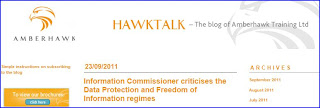
Blog wars this is not. And nor should this be seen as a note of correction from the Provisional Wing of the mobile telecoms industry’s Rapid Rebuttal Unit. But, occasionally, even the great Chris Pounder makes remark that deserves to be challenged. Or, perhaps as he knows that I’m an avid reader of his blog, he was just trying to get me to comment on the accuracy of what he said.
Good try, Chris. And it is in a spirit of constructive criticism that I challenge his remarks. Not spite. We’re both on the same side – really, we are.
Anyway, readers of his blog will have noticed that yesterday he was commenting (as I did in my posting on 16 September) about the Information Commissioner’s recent appearance before the Justice Committee:
The IC is also concerned about “spamming texts” when they say something like “Our records show that you are in line for a compensation payment of £4,750 for that accident you had. Text CLAIM or STOP". The problem is, the IC said, was that “if you text either, you are confirming that you are there and providing a marketing lead, because these are randomly generated texts”.
The IC added that “We are working very hard with OFCOM and the telecom companies to try to get to the source of these spam texts, but it is a bit like looking for the launch sites of V2 bombers in the Second World War”. I don’t buy this explanation at all: telecom companies that do not know who is using their network. Come off it – they charge for texts don't they?
Believe it or not, Chris, the phone companies (almost certainly) don't know the identities of the bad guys. This is because these guys are applying some clever technology to something that was created over a decade ago. They are very likely to be using anonymous SIM cards. You know, the ones you can get at any newsagent or main railway station, or from a huge variety of retail outlets. And how might they be charging up these SIM cards? By using cash, rather than electronic money.
And these guys will be clever, too. They'll be trying to cover their tracks. And they'll also be relying on the hope that the spambusters who are investigating them won't have the analytical skills and technical toys that, say, the Anti Terrorism Squad probably has. We do need a healthy dose of proportionality in the resources that they have at their command. They are unlikely to have the sort of technology we see on Spooks or the Bourne Identity.
These crooks will also be quite clever in how they operate these spam campaigns. For obvious reasons I don't intend to speculate on how they operate. I don’t want to give the game away. But these crooks also don't know how much the spambusters know about them. They don't know how close they are. Nor do I. But I do hope it won't be too long before the police dogs bark as a specialist team of officials mount a dawn raid and catch them off guard.
So, Chris may have noted that what he Commissioner did not do in his evidence was criticise the phone companies for the part they are playing in disrupting and catching the crooks. Perhaps the Commissioner knows something that Chris Pounder does not.
In conclusion, a plea to Chris: go easy on the telecoms networks please. They may be doing quite a bit more than you think, behind the scenes, but even they won’t yet know just who is behind these scams.
Source:
http://amberhawk.typepad.com/
.


